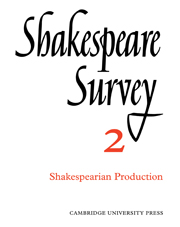Book contents
- Frontmatter
- Fifty Years of Shakespearian Production: 1898–1948
- An Original Drawing of the Globe Theatre
- The Projected Amphitheatre
- Ben Jonson and Julius Caesar
- The Booke of Sir Thomas More and its Problems
- The ‘Shakespearian’ Additions in The Booke of Sir Thomas More
- The Renaissance Background of Measure for Measure
- The Individualization of Shakespeare’s Characters through Imagery
- Trend of Shakespeare Scholarship
- Shakespeare in France: 1900–1948
- International News
- Shakespeare in New York: 1947–1948
- The Year's Contributions to Shakespearian Study 1 Critical Studies
- 2 Shakespeare’s Life and Times
- 3 Textual Studies
- Books Received
- Index
- Plate section
2 - Shakespeare’s Life and Times
Published online by Cambridge University Press: 28 March 2007
- Frontmatter
- Fifty Years of Shakespearian Production: 1898–1948
- An Original Drawing of the Globe Theatre
- The Projected Amphitheatre
- Ben Jonson and Julius Caesar
- The Booke of Sir Thomas More and its Problems
- The ‘Shakespearian’ Additions in The Booke of Sir Thomas More
- The Renaissance Background of Measure for Measure
- The Individualization of Shakespeare’s Characters through Imagery
- Trend of Shakespeare Scholarship
- Shakespeare in France: 1900–1948
- International News
- Shakespeare in New York: 1947–1948
- The Year's Contributions to Shakespearian Study 1 Critical Studies
- 2 Shakespeare’s Life and Times
- 3 Textual Studies
- Books Received
- Index
- Plate section
Summary
An article in last year’s Shakespeare Survey, examining twentieth-century studies on the Elizabethan stage, indicated the profits gained by the discernible movement away from the sweeping treatment of the general theme towards the detailed investigation of special problems. Capital instances were of course the volumes by J. C. Adams on the Globe theatre and by George F. Reynolds on the Red Bull. And this year we have from these scholars studies of just such a kind as were called for in this article: an essay by Adams on “The Original Staging of King Lear ” and one by Reynolds on “ Troilus and Cressida on the Elizabethan Stage”.
Adams goes through King Lear scene by scene, showing how he believes it must have been staged at the Globe. We cannot here attempt a précis of his paper but some of his generalizations startle one into a fresh realization of the latest changes in our conception of the Elizabethan stage, of how far the traditional notions of its 'bareness', of its 'restricted range', of its use have been modified—this, for example:
It is a basic principle of Elizabethan drama that a given stage may not be used in two successive scenes to represent two essentially different or widely separated places.
Or this:
Now the Elizabethan drama from beginning to end tended to support stage illusion by scenic realism.
The moral of it all is the complexity and subtlety of the arrangement of spaces that made up the Elizabethan stage, and the control that Shakespeare had over this medium: the last a remark that has been made often enough but one which hardly has much meaning until the precise nature of the medium and of this 'control' has been clarified. Reynolds, too, takes us a long way from the bare stage. The generalization he begins from is: that Elizabethan plays may have been given “with very different stage arrangements but without any difference appearing in either the text itself or in the stage directions”. He takes Troilus and Cressida—the problem of whether or not it was publicly performed is familiar—and suggests ways in which it could have been given on the public stage or privately—on, for instance, a stage erected in the dining hall of one of the Inns of Court. A bare stage with the curtained space and two unconcealed stage doors would have sufficed. But Reynolds asks if there was any reason why such austerity should have been sought for either at the Globe or for a private performance. And he envisages a setting constructed on the same principle as the Renaissance Terentian setting which provides as background a series of 'cells', and which depends on the medieval principle of symbolism and 'simultaneity'.
- Type
- Chapter
- Information
- Shakespeare Survey , pp. 141 - 144Publisher: Cambridge University PressPrint publication year: 1949



